Chapter
Mar 29, 2018
Life Cycle Energy and Carbon Analysis of Single Family Residential Buildings: Atlanta Case Study
Publication: Construction Research Congress 2018
Abstract
According to the United Nations Environment Program (UNEP), by the increasing number of population in the urban area, there is an urgent need of city-level action on reducing environmental emissions. Based on the 2015 U.S. energy flow chart, buildings are responsible for around 20% of U.S. energy consumption and consequential environmental emissions. Therefore, there is a great need of a systematic national and regional observation and management plan for monitoring buildings’ life cycle energy portfolio and their environmental impacts. The objective of this research is to study the residential buildings (1-story and 2-stories) built over decades, in the City of Atlanta and observe the trend of embodied and operational energy usage and the consequential carbon emissions over building’s life cycle. In this research, embodied energy is the energy consumed by all the processes associated with the production of a building, from the mining and processing of natural resources to manufacturing, transport and product delivery. To this end, a process-based life cycle assessment (LCA) method has been utilized to calculate the embodied carbon and energy of buildings considering their construction methods and materials. For building operations, nationally averaged public datasets such as Department of Energy (DOE) and Residential Energy Consumption Survey (RECS) from U.S. Energy Information Administration (EIA) were utilized. The preliminary results indicate that there is around 26% more embodied carbon associated with newer buildings. Also, the results indicate that 2-story buildings have around 11% less embodied energy per square footage, in comparison to 1-story buildings. Additionally, newer residential buildings consume less energy per square footage over their operational life span. The result of this research, combined with the analysis of other building types and infrastructures of the city, can then be used by policy makers and city planners to improve the sustainability and energy-efficiency of this metropolitan area.
Get full access to this article
View all available purchase options and get full access to this chapter.
Information & Authors
Information
Published In
Copyright
© 2018 American Society of Civil Engineers.
History
Published online: Mar 29, 2018
Permissions
Request permissions for this article.
Authors
Affiliations
Ph.D. Student, Economics of Sustainable Built Environment Lab, School of Building Construction, Georgia Institute of Technology, Atlanta, GA 30332. E-mail: [email protected]
Associate Professor and Brook Byers Institute for Sustainable Systems Fellow, Director, Economics of Sustainable Built Environment Lab, School of Building Construction and School of Civil and Environmental Engineering, Georgia Institute of Technology, Atlanta, GA 30332. E-mail: [email protected]
Metrics & Citations
Metrics
Citations
Download citation
If you have the appropriate software installed, you can download article citation data to the citation manager of your choice. Simply select your manager software from the list below and click Download.
View Options
Get Access
Access content
Please select your options to get access
Log in/Register
Log in via your institution (Shibboleth)
ASCE Members:
Please log in to see member pricing
Purchase
Save for later Item saved, go to cart Information on ASCE Library Cards
ASCE Library Cards let you download journal articles, proceedings papers, and available book chapters across the entire ASCE Library platform. ASCE Library Cards remain active for 24 months or until all downloads are used. Note: This content will be debited as one download at time of checkout.
Terms of Use: ASCE Library Cards are for individual, personal use only. Reselling, republishing, or forwarding the materials to libraries or reading rooms is prohibited.
Terms of Use: ASCE Library Cards are for individual, personal use only. Reselling, republishing, or forwarding the materials to libraries or reading rooms is prohibited.
Get Access
Access content
Please select your options to get access
Log in/Register
Log in via your institution (Shibboleth)
ASCE Members:
Please log in to see member pricing
Purchase
Save for later Item saved, go to cart Information on ASCE Library Cards
ASCE Library Cards let you download journal articles, proceedings papers, and available book chapters across the entire ASCE Library platform. ASCE Library Cards remain active for 24 months or until all downloads are used. Note: This content will be debited as one download at time of checkout.
Terms of Use: ASCE Library Cards are for individual, personal use only. Reselling, republishing, or forwarding the materials to libraries or reading rooms is prohibited.
Terms of Use: ASCE Library Cards are for individual, personal use only. Reselling, republishing, or forwarding the materials to libraries or reading rooms is prohibited.
